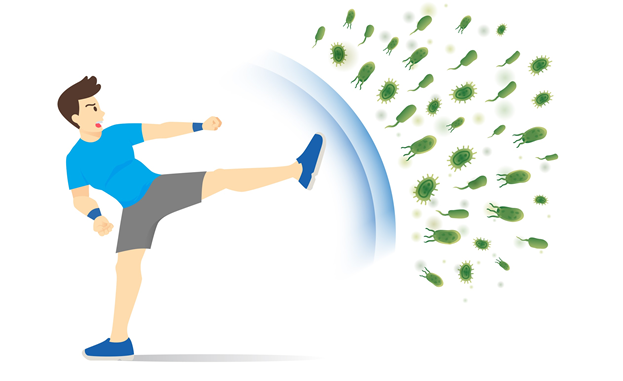August is National Immunization Awareness Month Here are 5 Important Immunizations You Need

August marks the annual observance of National Immunization Awareness Month. The event highlights how important it is for people of all ages to get their immunizations to battle illnesses like flu, measles, and shingles. Many people are under the impression that once you get your vaccinations as a child to go to school, you are done. This is not true; immunizations are an important part of staying healthy at any age and consulting with your doctor about which vaccinations are most appropriate for you can help keep you safe from many illnesses.
Flu Shots
This year, 2020, the seasonal flu shot will be more important than it has been in recent years. Due to the global pandemic of COVID-19, for which no vaccine is available, people have to be more careful about minimizing the risks of other illnesses. In a climate of economic uncertainty and an overwhelmed healthcare system, your seasonal flu vaccine is one of the most important things on your to-do list. The CDC highlights that this upcoming flu season, reducing the risk of contracting the flu, is incredibly necessary because it can help reduce the overall impact of respiratory illnesses and lessen the burden on the healthcare system during the COVID-19 pandemic.
Shingles
Shingles is an infection caused by the same virus that causes chickenpox, varicella-zoster virus. Shingles can be painful and cause significant rashes in the eyes, face, torso, or buttocks. While shingles itself is not contagious, the virus could pass on to someone else who doesn’t have the vaccine or hasn’t had chickenpox before and cause them to develop that illness. Adults older than 60 years are advised by the CDC to get the shingles vaccine regardless of whether they remember having shingles or chickenpox in the past. Shingles don’t usually strike twice, but it is possible.
HPV Vaccine
Human papillomavirus is the most common sexually transmitted infection. Most become infected in their late teens or early twenties. This is why the CDC recommends parents talk to their pediatrician about the vaccine for children between the ages of 11-12 for the first dose, followed by a second dose six to twelve months later. People up to the age of 26 can still get the immunization, but the benefit will be reduced by the fact that they may already have come into contact with the virus. Some patients can also decide they want to get vaccinated after age 27 after talking to their doctor, but again the efficacy is not the same. What this particular immunization does is prevent cancer-causing and precancer infections that are caused by the human papillomavirus.
TD Tetanus, Diphtheria
The TD vaccine helps prevent tetanus and diphtheria. Tetanus causes muscles to stiffen and develop bouts of pain. Tetanus carries the possibility of leading to severe health issues, which can include the inability to open one’s mouth, trouble swallowing, breathing, or in some cases, death. Tetanus enters the body by way of an open cut or wound. Meanwhile, diphtheria is spread from person to person and can lead to paralysis, heart failure, difficulty breathing, and even death. Children seven or older are eligible for the vaccine as well as teens and adults. The TD vaccine is given every ten years, so make sure you speak with your doctor about this if you are older and don’t remember when was the last time you were vaccinated.
Hepatitis A and B
The hepatitis A and B vaccine help by teaching your body to produce the antibodies needed to fight the hepatitis A and B virus. Hepatitis A is a disease of the liver that can lead to death. Hepatitis A is spread most often through infected food or water. While in the U.S, Hepatitis A is less common due to higher sanitation levels, and the availability of this vaccine, it is still an important immunization. Make sure you speak to your child’s doctor about it, or your doctor, if you are an adult who hasn’t had the vaccine. Hepatitis B is most commonly spread by contact with body fluids, such as blood, saliva, semen, or vaginal fluids, as well as needle sharing. Mothers can also pass it on to their children if they are infected. This vaccine is a combination to address both illnesses and is recommended for everyone over the age of 18, and in particular for people military personnel, people working or moving to places with high infection rates, and people concerned about their sexual activity.
Many people think we get all our vaccines when we are children to go to school, and that’s the end of it. The truth is, you should always talk to your doctor about your medical history and proactively discuss your immunization options. The CDC has great resources online as to vaccine recommendations pertinent to people of all ages as well as women who may become or are currently pregnant, and people embarking to another country for work. This year, in particular, these immunizations are important because healthcare systems around the country and around the world have been overwhelmed by the illness caused by the novel coronavirus. Talk to your doctor or your child’s doctor about recommended vaccinations and keep a record of it, and when any vaccinations must be repeated. If you are a caregiver or involved in the medical or health decisions of an older parent or relative, make sure you take time to visit the doctor with them and make sure that they too are being appropriately advised. The older we get, the more susceptible our immune systems become to viruses and diseases.